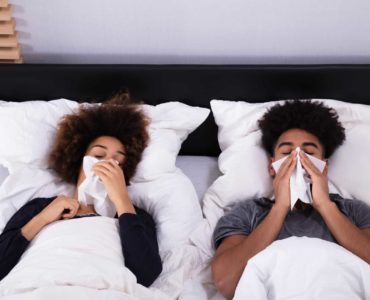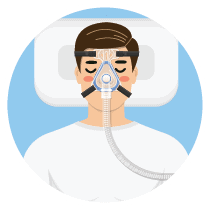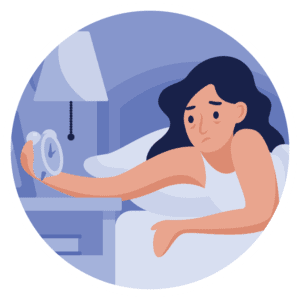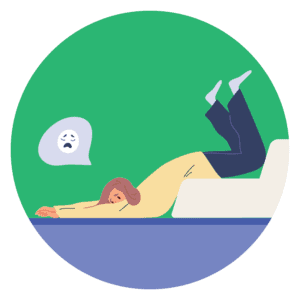Sleep Disorders & COVID-19: What You Need to Know
The coronavirus pandemic has ushered in a period of great uncertainty for most people. Here, at Sleep Health Solutions, we have heard from clients with a lot of concerns about insomnia, fatigue, sleep apnea, and other respiratory sleep disorders as they relate to COVID-19.
In order to be a point of reference in this difficult time, we have formulated the following page. Here we provide information about sleep disorders as a risk factor for contracting COVID-19, the link between the pandemic and symptoms like sleep deprivation, anxiety, and fatigue, and answers to some of the most frequently asked questions.
Get more information about risk factors and symptoms related to sleep disorders, including sleep apnea, insomnia (or ‘coronasomnia’), and Post-COVID Fatigue Syndrome.
COVID-19
Sleep Apnea
Sleep Apnea Linked to Coronavirus Complications
Medical experts have clearly warned the public that older people and those with underlying conditions are at high-risk for COVID-19. Some of the risk
factors for the coronavirus overlap with the same risk factors for obstructive sleep apnea.
Do I have a higher risk of getting coronavirus because I have sleep apnea?
COVID-19 complications. People who have a higher risk for severe illness from the coronavirus include:
- Those who are 65 years of age or older.
- Those who have serious underlying medical conditions. These conditions include:
- Chronic lung disease,
- Moderate to severe asthma,
- Serious heart conditions,
- Severe obesity with a body mass index (BMI) of 40 or higher,
- Diabetes,
- Chronic kidney disease,
- Liver disease.
- Those who have a medical disorder, or take a medication, that weakens the immune system.
- Those who have had close contact with another person who has the coronavirus.
Learn more about the risk factors for coronavirus complications.
Concerns about CPAP Therapy
For those with obstructive sleep apnea, continuing with CPAP therapy while sleeping is important. However, some other factors should be considered during this time of pandemic in order to use it safely. You should pay special attention to cleaning and disinfecting the CPAP machine, replacing the filter as recommended, and using it away from others who may be at greater risk for contracting COVID-19.
CPAP therapy has been shown to facilitate the transmission of COVID-19 from person to person. Droplets and airborne particles containing the infection can be passed through shared or reused equipment that is not properly disinfected or aerosol generated by the machine.
It’s important to understand that though continuing to use your CPAP machine is important, it can also cause a higher risk of transmitting the virus to others. The COVID-19 virus is also known to be viable on surfaces for several hours after aerosolization.
If I have symptoms of the coronavirus, should I continue using my CPAP?
- Try to sleep on your side or with your head elevated at least 30 degrees.
- Use a dental device if you already have one.
- Ask for medication to treat any nasal congestion that you experience.
- Avoid drinking alcohol or taking sleeping medications and sedatives.
- Avoid driving if you feel tired or fatigued.
If your doctor advises you to continue using the CPAP device, here are some precautions and advice to follow
during that time.
- Follow strict quarantine measures and consider ways to prevent other people in the house from contracting the illness. If possible, isolate yourself in a separate bedroom and use a separate bathroom. In this “recovery room,” you can continue to use CPAP while you sleep alone.
- If you must go to the hospital for any reason, bring the CPAP equipment with you.
- Once you are no longer consider infections, replace all disposable parts of the device, such as masks, tubing, and filters.
Be sure to follow these steps for routine CPAP care:
- Wash your hands thoroughly with soap and water before and after handling the CPAP device, mask, tubing and filters.
- Clean your CPAP equipment according to manufacturer’s instructions.
- Change filters and accessories as directed in your CPAP user guide.
- Avoid letting anyone smoke in your home, especially around the CPAP machine.
- Keep pets away from your CPAP machine.
- Use distilled water in your humidifier to keep the tub clean.
- After you have recovered from the coronavirus, replace your CPAP filters and disposable accessories.
**Seek medical attention immediately if you develop emergency warning signs for COVID-19. Emergency warning signs include trouble breathing and persistent pain or pressure in the chest.
If I have symptoms of the coronavirus, will using CPAP spread the virus to others?
Current evidence suggests that the virus that causes COVID-19 spreads between people who are in close contact with one another (within about 6 feet). It is transmitted through respiratory droplets produced when an infected person coughs or sneezes. However, there is some concern that using CPAP could spread the virus through the exhalation port, which allows carbon dioxide to escape from your mask. This port also may release smaller virus-containing particles as an “aerosol,” which can remain suspended in the air for a few hours. It’s possible that your bedpartner could inhale these virus particles. Therefore, it is important to sleep alone by isolating yourself in a separate bedroom. You can continue to use CPAP while sleeping in this recovery room.
The coronavirus also can remain on surfaces for a long time. Others could get the virus by touching an infected surface and then touching their own mouth, nose, or eyes. Be sure that you routinely clean “high-touch” surfaces in your recovery room and bathroom. This includes include phones, remote controls, counters, tabletops, doorknobs, bathroom fixtures, toilets, keyboards, tablets, and bedside tables.
Should I use CPAP if I have symptoms of the coronavirus but can’t self-isolate?
If you have symptoms of the coronavirus but are unable to isolate yourself in a separate bedroom, then you should contact your medical provider. Ask your medical provider if there are short-term interventions or alternative treatments for sleep apnea that could help you while you recover from the coronavirus.
If I have the coronavirus, will my CPAP be helpful for my breathing? Or could CPAP cause the coronavirus to get worse?
If you have the coronavirus, you should continue using CPAP while sleeping alone in a separate bedroom. There is no evidence that using CPAP will cause the coronavirus to get worse.
Review this information about the importance of sleep for COVID patients.
If I have the coronavirus, how should I clean and disinfect my CPAP mask and hose?
You should clean and disinfect your medical equipment according to the manufacturer’s instructions. The directions for CPAP masks and hoses normally include regular cleaning with soap and water.
You can find more tips for properly cleaning and maintaining CPAP equipment here: How to clean your CPAP equipment and Keeping it clean: CPAP hygiene.
You should also clean and disinfect frequently touched surfaces in your household. This includes doorknobs, light switches and handles.
Learn more from the CDC about how to clean and disinfect your household
.
Is it safe to use CPAP if I don’t have symptoms of the coronavirus?
If you have the coronavirus, you may be able to spread it to others before you have symptoms. Even if you don’t have symptoms of the coronavirus, you may want to sleep and use CPAP in a separate bedroom during this public health emergency.
Get more expert advice on how to manage sleep apnea during the COVID-19 pandemic.
Distilled water is unavailable in my area. What should I use in my CPAP humidifier?
According to ResMed, “optimal humidifier performance requires distilled water. That’s because most or all of its minerals have been removed, preventing mineral buildup in the humidifier tub. That said, tap or bottled water may also be used. It will not harm the device or pose a risk to patients. It will, however, require more rigorous humidifier cleaning to prevent excess mineral buildup in the tub.”
If I’m asymptomatic, what precautious should I take when using my CPAP device at home?
According to the American Academy of Sleep Medicine (AASM), there may be increased risk of transmission of COVID-19 to others in the environment if a CPAP device is used. Additionally, you may be at risk of becoming re-infected from reusing tubing, filters, and/or masks.The AASM provides the following recommendations for asymptomatic patients and for those who suspect they may be positive for the virus.
- The person using CPAP should sleep in a separate bedroom; and if possible, a separate bathroom.
- Continue carefully cleaning your CPAP according to the manufacturer’s guidelines. Below, you can find more tips for properly cleaning and maintaining CPAP equipment:
- Keeping it clean: CPAP hygiene.
- How to clean your CPAP equipment.
- If distilled water is not available for the humidifier, one can substitute in the short-term with purified bottled water or filtered tap water. Well water should be avoided. Durable medical equipment
companies (DMEs) can provide replacement humidification chambers. See these instructions for making your own distilled water. - Completely dry the humidifier, mask and tubing once it is washed.
- Disinfection of the humidifier chamber can be done with vinegar and water according to the manufacturer’s guidelines. Avoid adding chemicals or disinfectants to the humidifier chamber that are
not recommended by the manufacturer. This can lead to inhalational lung injury. - Avoid leaving the CPAP device running when not in use.
- Address significant mask leaks with your sleep coach.
Can CPAP devices be used in emergencies as a substitute for ventilation
Basic CPAP and bilevel PAP are not designed to function as ventilators. ASV (adaptive servo ventilation) is a device specifically used to treat central sleep apnea, and is also not meant to function as a ventilator in the scenario of respiratory failure.
There are PAP therapy device with non-invasive ventilation (NIV) capacity. These devices include bilevel PAP ST, AVAPS (average volume assured pressure support), iVAPS (intelligent volume assure pressure support). These devices are not a substitute for the use of a ventilator in case of acute respiratory failure. Also, important to note is that they are open circuits with the same risk of droplet and aerosolized particle spread of virus as other PAP devices.
Should there arise a need to use PAP/NIV device to assist with mild hypoxemia and hypercarbia pending endotracheal intubation, adaptations will need to be made to the masks and filtration systems. In these scenarios, it is best to use an oro-nasal mask that is well fit and avoid using nasal or nasal pillow masks. New information is emerging daily in this area. We recommend monitoring the manufacturer’s websites, as well as the following medical societies:
Insomnia
Sleep Deprivation as a Possible Risk Factor for Coronavirus
Doctors have long known that sleep deprivation damages your health. Studies have shown a strong correlation between the amount of sleep that someone gets at night and their body’s ability to protect itself and recover from infections. In short, getting the recommended amount of sleep helps boost the immune system.
When we look at COVID-19, specialists believe that good quality sleep can reduce the risk. Being well-rested increases your body’s resistance to contracting the infection and helps your ability to fight it off.
What can I do to decrease my risk for getting the coronavirus?
It may sound crazy, but getting the recommended amount of sleep every night actually help decrease your risk of getting sick. Quality sleep supports the immune system and help prevent infection.
Get more tips on how to prevent getting sick.
Sleeplessness Due to the Pandemic
Healthcare professionals are seeing an increase in patients reporting anxiety, depression, and sleeplessness. The physical and psychological issues are often connected and, during the COVID-19 pandemic, they are exacerbated by multiple factors:
- High stress and general uncertainty,
- Social isolation and lack of support from others,
- Economic hardship,
- Concerns for one’s health and the health of loved ones,
- Fears about the future,
- Disruption or lack of daily routines,
- Lockdown fatigue,
- Increased screen time,
- Less time for relaxation and self-care.
What can I do to reduce anxiety during this period?
The pandemic has caused many people to experience higher levels of stress, anxiety, and fear. As mentioned above, worries about job security, concerns for your health, and feelings of isolation are common during this time.Supporting mental health should become a priority for anyone that is experiencing these feelings. The CDC recommends limiting the time spent watching the news or engaging in social media, taking care of your body with a healthy diet and exercise, finding time to relax during the day, and talking with friends and family. Get more advice on healthy ways to cope with stress.
Can sleep cycles be affected by the COVID-19 pandemic?
Stressful situations affect people in different ways and, often, they can make it difficult to fall asleep or sleep well through the night.Additionally, the pandemic has interrupted many of our routine activities that support a regular sleep-wake cycle. Try to wake up, go to bed, get physical activity and eat meals at the same time every day to help your body stay on schedule. Meditation, journaling, and reading before bed can also help you relax. Get more tips on calming your mind.
Insomnia Is on the Rise Because of COVID-19
The explanation above applies here as well. More people are experiencing anxiety caused the pandemic itself and the measures put in place to prevent the spread of the virus and protect people’s health, including stay-at-home orders, lockdowns, travel bans, and social distancing. As a result, more are also suffering from sleeplessness.
When difficulty falling asleep and/or staying asleep become long-term, this is called insomnia. And recently a new term has been coined to describe insomnia during this period; it’s called COVID-Somnia.
Find out more about drug-free treatment options for insomnia.
Is it possible to experience sleep problems because of the pandemic?
Yes. All of the stressful factors that have been caused by the pandemic and the disruption of normal daily routines has led to a 37% increase in clinical insomnia this year. Stress-related insomnia is not uncommon when you consider the hardships that people are faced with – unstable income, juggling work and homeschooling, separation from family and friends, loneliness…
Get more information about how to improve sleep quality.
Post-COVID Fatigue
Just like with other viral infections, those recovering from COVID-19 may feel tired and lack energy for a period of time. According to the CDC, about 35% of patients recovering from the coronavirus feel fatigued for longer than other post-viral syndromes. Symptoms can persist for weeks following clinical recovery and after testing negative.
Is it normal that I feel tired after recovering from COVID-19?
Chronic fatigue is a common problem for people recovering from the coronavirus. Even those with mild cases, may feel tired or that they lack energy for multiple weeks after being considered ‘recovered.’ Tired symptoms following COVID-19 illness are considered typical for this type of post-viral syndrome.
Read more about how to boost your energy throughout the day.
How long does COVID-19 recovery take?
Sleep Disorder Services at Sleep Health Solutions – COVID-19 Precautions
We are following the current recommendations from the American Academy of Sleep Medicine with regards to clinical sleep testing and sleep clinic visits if there is substantial community spread:
- Postponing laboratory sleep studies for all clients. We are evaluating potential urgent requests on a case-by-case basis.
- Providing HSAT services, using only disposable HSAT devices. We use disposable parts and thoroughly disinfect the fixed components.
- The Sleep Health Solutions clinic is open for phone calls, telemedicine visits, remote sleep coaching, and emergency in-person visits.
- We will work with clients if it’s necessary to extend scheduled sleep study evaluations and follow-up visits.
- Our staff is relaxing the requirements for face-to-face evaluations. To facilitate care and help protect the health of our clients, we are favoring telehealth as the safest option whenever in-person visits can be substituted.
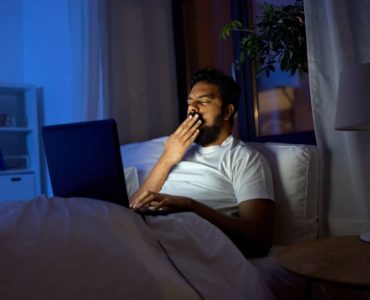
Revenge Sleep Procrastination Is on the Rise
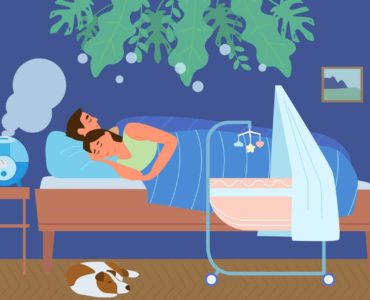
Protect Your Health and Sleep Better with a Humidifier
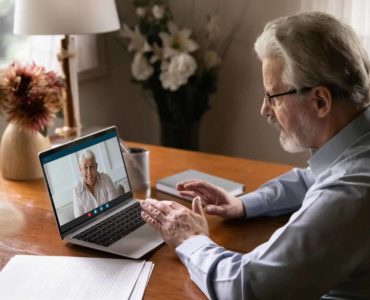
Sleep Telemedicine: Insomnia & Sleep Apnea Treatment Goes Virtual
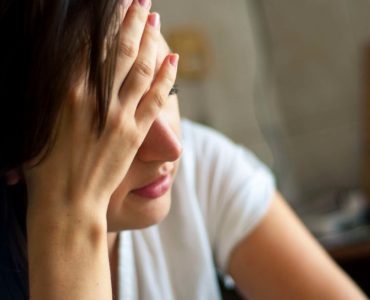
The Struggle Is Real: Post-COVID Fatigue
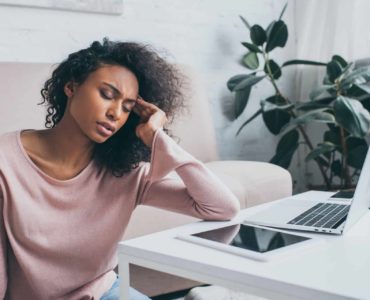
Virtual Learning & Working from Home: Why You Can’t Sleep These Days
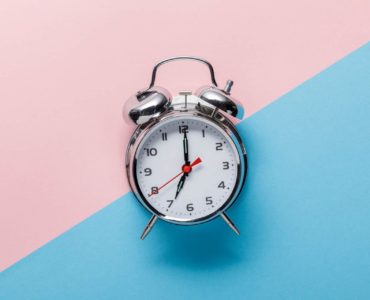
5 Tips to Get Your Sleep Schedule Back on Track
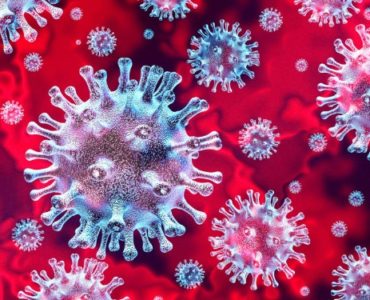
Coronavirus Concerns for Patients with Sleep Apnea
